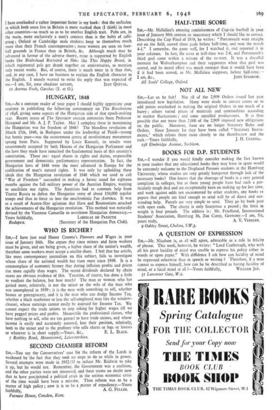HUNGARY, 1848
Sta,—As a constant reader of your paper I should highly appreciate your courtesy in publishing the following commentary on The Revolutions of 1848, giving some aspects of the Hungarian side of that epoch-making year. Recent issues of The Spectator contain comments from Professor Hawgood and Mr. A. J. P. Taylor. May I complete these in mentioning the Hungarian war for freedom of 1848? The bloodless revolution of March 15th, 1848, in Budapest under the leadership of Petofi—young but heroic poet—was the easternmost centre of revolutionary movements sprung from Paris. Supported by Louis Kossuth, its results were unanimously accepted by both Houses of the Hungarian Parliament and the laws they made have remained the fundamental basis of this country's constitution. These are: equal shares in rights and duties, responsible government and democratic parliamentary representation. In fact, the Hungarian laws of 1848 were the most advanced in Europe for the codification of man's natural rights. It was only by upholding these ideals that the Hungarian revolution of 1848 which we used to call "War of Freedom " succeeded in making a heroic stand for eighteen months against the full military power of the Austrian Empire, wanting to annihilate our rights. The Austrians had to summon help from Tzarist Russia to defeat the Hungarian army of about 150,000 regular troops and thus to--force us into the anachronistic Per Autriaca. It was as a result of Austro-Slav agitation that Slays and Roumanians attacked the achievements of the Hungarian revolution. This method was naturally devised by, the Viennese Camarillo to overthrow Hungarian democracy.—
Budapest. (Secretary of the Hungarian Pen Club).






























 Previous page
Previous page